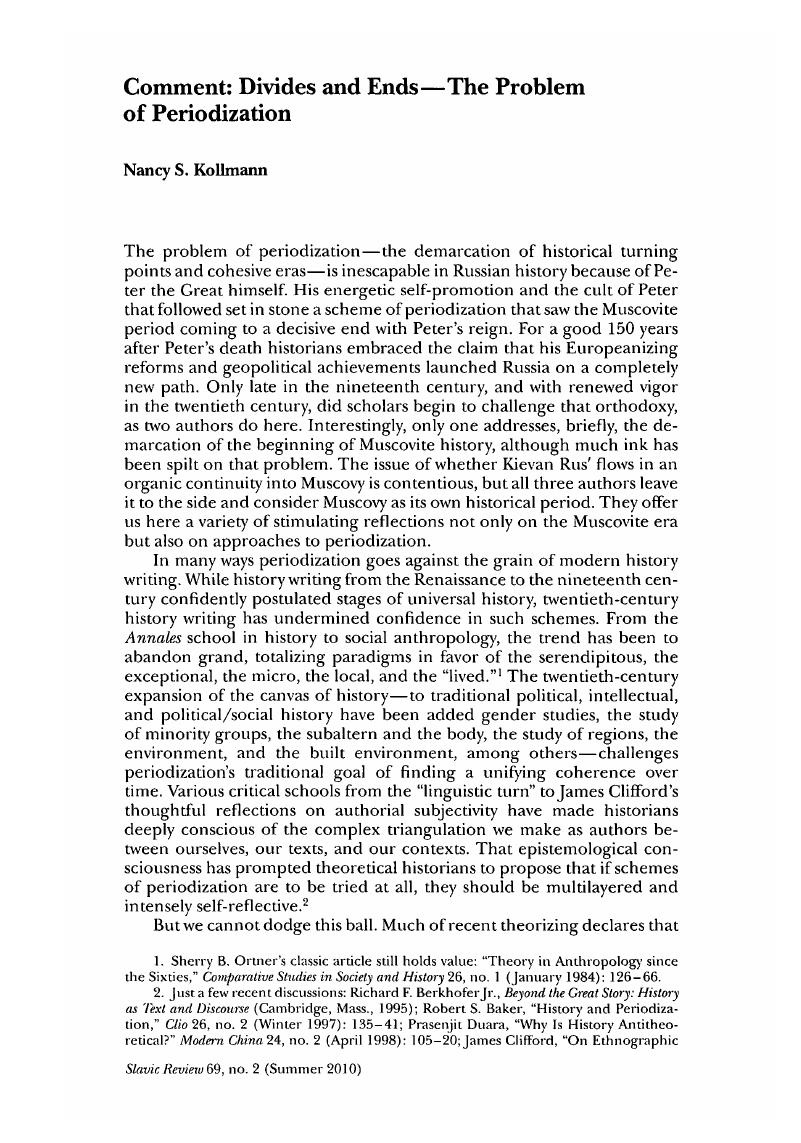Article contents
Comment: Divides and Ends–The Problem of Periodization
Published online by Cambridge University Press: 27 January 2017
Abstract

- Type
- Forum: Divides and Ends Periodizing the Early Modern in Russian History
- Information
- Copyright
- Copyright © Association for Slavic, East European, and Eurasian Studies. 2010
References
1. Ortner's, Sherry B. classic article still holds value: “Theory in Anthropology since the Sixties,” Comparative Studies in Society and History 26, no. 1 (January 1984): 126-66.CrossRefGoogle Scholar
2. Just a few recent discussions: Berkhofer, Richard F. Jr, Beyond the Great Story: History as Text and Discourse (Cambridge, Mass., 1995)Google Scholar; Baker, Robert S., “History and Periodization,” Clio 26, no. 2 (Winter 1997): 135-41Google Scholar; Prasenjit Duara, “Why Is History Antitheoretical?“ Modern China24, no. 2 (April 1998): 105–20;James Clifford, “On Ethnographic Authority,” The Predicament of Culture: Tiuentieth-Century Ethnography, Literature, and Art (Cambridge, Mass., 1988), 21–54.
3. Topolski, Jerzy, “Periodization and the Creation of the Narrative Wholes,” Sloria delta Storiografiia 37 (2000): 11–16.Google Scholar
4. Martin, Russell E., “Gifts for the Bride: Dowries, Diplomacy and Marriage Politics in Muscovy,” Journal ojMedieval and Early Modern Studies 38, no. 1 (Winter 2008): 131.Google Scholar
5. Kliuchevskii, V. O., “Kurs russkoi istorii,” in his Sochineniia, 8 vols. (Moscow, 1956-59), 2:198.Google Scholar
6. See this argument in Pavel Miliukov's introduction to the final edition of his threevolume history: “Vvedenie,” Ocherki po istorii russkoi kul'tury v 3-kh tomakh (1937; Moscow, 1993), vol. l,pt. 1.
7. Wesling, Donald, “Michel Serres, Bruno Latour, and the Edges of Historical Periods,” Clio 26, no. 2 (Winter 1997): 189–204.Google Scholar
8. This list only touches the surface of a rich literature on the eighteenth century. E. V Anisimov, Dyba i knut: Politicheskii sysk i russkoe obshchestvo v XVIII v. (Moscow, 1999); Kamenskii, Aleksandr B., Povsednevnost’ russkikh gorodskikh obyvatelei: Istoricheskie anekdoty iz provintsial'noi zhizni XVIII veka (Moscow, 2006)Google Scholar; Lavrov, A. S., Koldovstvo i religiia v Rossii: 1700–1740 gg. (Moscow, 2000)Google Scholar; Marasinova, E. N., Psikhologiia elity rossiiskogo dvorianstva poslednei treti XVIII veka: Po materialam perepiski (Moscow, 1999)Google Scholar; Marker, Gary J., Publishing, Printing, and the Origins of Intellectual Life in Russia, 1700–1800 (Princeton, 1985)CrossRefGoogle Scholar; Michelle Lamarche Marrese, A Woman's Kingdom: Noblewomen and the Control of Property in Russia, 1700–1861 (Ithaca, 2002); Boris Nikolaevich Mironov, Sotsial'naia istoriia Rossii perioda imperii: XVIII-nachalo XXv.: Genezis lichnosti, demokraticheskoi sem'i, grazhdanskogo obshchestua i pravovogo gosudarstva (St. Petersburg, 1999); Smilianskaia, E. B., Volshebniki, bogokhul'niki, eretiki: Narodnaia religioznost’ i “dukhovnye prestupleniia” v Rossii XVIII v. (Moscow, 2003)Google Scholar; Douglas Smith, Working the Rough Stone: Freemasonry and Society in Eighteenth- Century Russia (DeKalb, 1999); Cynthia Hyla Whittaker, Russian Monarchy: Eighteenth-Century Rulers and Writers in Political Dialogue (DeKalb, 2003); Elise Kimerling Wirtschafter, The Play of Ideas in Russian Enlightenment Theater (DeKalb, 2003).
9. Marc Raeff, Understanding Imperial Russia: State and Society in the Old Regime, trans. Arthur Goldhammer (New York, 1984), chap. 2; Cracraft, James, The Revolution of Peter the Great (Cambridge, Mass., 2003).Google Scholar
- 3
- Cited by


